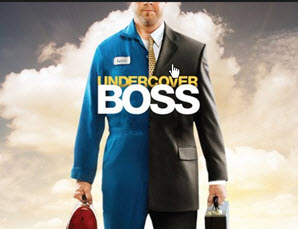“Undercover Candidate” Brings Tears, Promotions and Firings

Undercover Boss: A high ranking company official or owner goes undercover in his or her own organization. The reality show creates a disguise – adding or subtracting hair, yellowing teeth, adding tattoos or moles – hoping that the leader won’t be recognized so he or she can experience the company and the employees as they truly are. This unveils a wide gamut of employee behavior, from people who get fired on the spot to people who get rewarded with tens of thousands of dollars, a life-changing sum of money for their stellar loyalty and customer service.
The Candidate Experience Awards: This annual effort allows companies to examine the success of their hiring process from the candidate’s perspective. Thousands of candidates are surveyed in the job market to find out whether they were treated well – or not – by the potential employer.
How “Undercover Candidate” Will Work
Each week, a CHRO or VP of Talent Acquisition from a large company goes undercover to apply for a job at her (or his) company. In the first step, a camera crew follows the VP of TA as she constructs the ideal resume for the job and uploads it into the application stream. The VP of TA shares commentary on communication, friendliness, and alignment of employer branding. We rely on “TV magic” for the time elapse (just like pulling the finished casserole out of Rachel Ray’s oven) until the VP of TA receives notification inviting her to the next step of the hiring process. Or, she is rejected and the hiring process is over before it really began.
The real action begins as the automated realm gives way to the more personal. This is the true testament to the company leader and her ability to pull off the ideal candidate to the end. Might there be a virtual interview ? An assessment? At this point, professionals swoop in to disguise this leader so she can participate in face-to-face interviews and complete the process. The goal is to be fully immersed in what job candidates really go through when applying, interviewing, and interacting with the company, its brand and its people.
Would You Fund This Reality Series?
So, what do you think? For the TA leader in this large company, it’s a once-in-a-lifetime opportunity to truly experience the employer brand, identify the clunkiest parts of the online system, and judge the recruiters’ and hiring managers’ skill at interviewing.
Just like Undercover Boss, the unveiling at the end of the show will be filled with tears, promotions, and firings:
- If the online application system was buggy and frustrating, it’s time to talk to the employees who brought this tool in or the department that built it in-house.
- If the video interview went smoothly with beautiful branding and support, let’s reward the employees who spearheaded this innovative practice.
- If the initial interview questions were inane and a complete waste of time, let’s spend time to properly train people to interview better.
- If half the time the interviewers were late to the interview, let’s punish them severely as they are needlessly diminishing candidates’ interest in the company.
Back to Real Reality
Ok, so you’ll help me get this reality series off the ground? If I were a TV higher-up, I sure would. With my reality tied so tightly to recruitment and talent acquisition, I absolutely believe in the need to secret-shop the hiring process. The results may come back that everything is on track. Or, they may reveal some opportunities for improvement. Either way, it’s an investment in making your hiring process the best it can be –and that will surely lead to better hiring outcomes.

